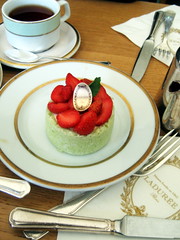
Laduree Sublime
Originally uploaded by ameliefreak
Food is a luxurious treat here. Fast food takes on an entirely different realm with ingenious chains like Quick. Wine flows freely (in no way necessarily associated with the title here). Itinerant stands offer greasy kabab sandwiches and Nutella crepes side-by-side. Rich creams and sauces keep the salmon and salads afloat, not drenched. Couscous and other cuisine of Afrique infiltrates little streets which perhaps had tables once graced only by le pain and a bottle. All of this gracious bounty doesn't come cheap, but that makes it that much more important. American me eyes the natives with wonder at their slender frames in spite of the bounty. Portions are key, and it's evident with what American me sniffs at with every Euro automatically converted into dollars in her head. The rhythms of this city hardly interfere with the pace and polish of picturesque cafes poised on corners for tourists bustling with digicams in hand for the next showing at the Moulin Rouge. Even on the most tourist-y strip in France can one relax with a fragrant cup of tea and the beauty of simple, halved strawberries perched pretty upon a pistachio and mint pastry.
